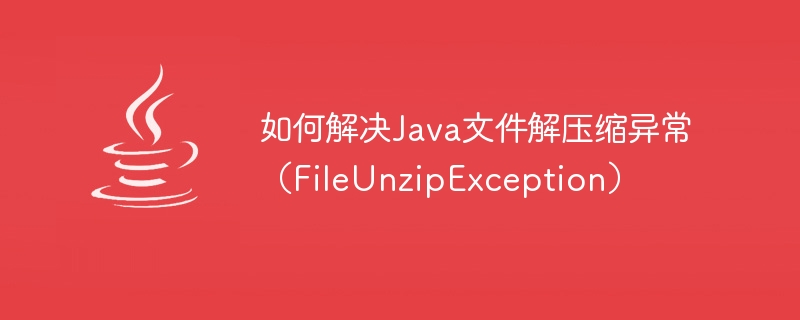Home >Java >javaTutorial >How to solve Java file decompression exception (FileUnzipException)
How to solve Java file decompression exception (FileUnzipException)
- PHPzOriginal
- 2023-08-25 14:49:552263browse

How to solve Java file decompression exception (FileUnzipException)
Introduction:
In the process of file operations, you often encounter the need to decompress files. . In Java, we can use some open source libraries (such as apache commons compress) to handle file decompression. However, sometimes during the decompression process, a FileUnzipException may be encountered. This article describes possible causes of this exception and provides solutions and code examples.
1. Reason for exception:
FileUnzipException exception is usually caused by the following reasons:
- Compressed file damage: The compressed file may be damaged during transmission or storage. Causes decompression exception.
- Compressed file format is not supported: The decompression library may not support a specific compressed file format, causing decompression exceptions.
- File path does not exist: During the decompression process, if the specified target file path does not exist, the decompression process will throw an exception.
2. Solution:
For different reasons, we can adopt different solutions:
- Check the integrity of the compressed file:
In The integrity of the compressed file can be verified using its checksum before decompression. For example, for zip files, you can use the CRC32 class to calculate the checksum of the file and then compare it to the original checksum of the compressed file. If the checksums do not match, the compressed file may be corrupted and needs to be redownloaded or retransmitted. - Check the compressed file format:
Before using the decompression library, you can check the format of the compressed file first. For example, for zip files, you can use the isZipFile() method of the ZipFile class to determine whether the file is a valid zip file. If the file format is not supported, you can choose other decompression libraries or convert the file format as needed. - Check whether the file path exists:
Before decompressing the file, you should first check whether the target file path exists. If the target path does not exist, you can create the target folder first and then perform the decompression operation. You can use the mkdirs() method of the File class to create the target folder.
3. Code example:
The following is a code example that uses the apache commons compress library to decompress a zip file:
import org.apache.commons.compress.archivers.ArchiveException;
import org.apache.commons.compress.utils.IOUtils;
import java.io.File;
import java.io.FileInputStream;
import java.io.FileOutputStream;
import java.io.IOException;
import java.util.zip.ZipEntry;
import java.util.zip.ZipInputStream;
public class FileUnzipExample {
public void unzip(File zipFile, File destDir) throws IOException {
if (!zipFile.exists()) {
throw new FileNotFoundException("Zip file not found.");
}
// Check if destination directory exists
if (!destDir.exists()) {
destDir.mkdirs();
}
try (ZipInputStream zipIn = new ZipInputStream(new FileInputStream(zipFile))) {
ZipEntry entry = zipIn.getNextEntry();
while (entry != null) {
String filePath = destDir + File.separator + entry.getName();
if (!entry.isDirectory()) {
extractFile(zipIn, filePath);
} else {
File dir = new File(filePath);
dir.mkdirs();
}
zipIn.closeEntry();
entry = zipIn.getNextEntry();
}
}
}
private void extractFile(ZipInputStream zipIn, String filePath) throws IOException {
try (FileOutputStream fos = new FileOutputStream(filePath)) {
IOUtils.copy(zipIn, fos);
}
}
public static void main(String[] args) {
File zipFile = new File("path/to/zipfile.zip");
File destDir = new File("path/to/destination");
FileUnzipExample unzipExample = new FileUnzipExample();
try {
unzipExample.unzip(zipFile, destDir);
System.out.println("File unzipped successfully.");
} catch (IOException e) {
e.printStackTrace();
System.out.println("Failed to unzip file: " + e.getMessage());
}
}
}Summary:
Solve Java file decompression Exceptions (FileUnzipException) require different solutions for different reasons. We can solve this exception by checking the integrity of the compressed file, the format of the compressed file, and whether the target file path exists. Through reasonable exception handling and code writing, we can effectively solve file decompression exceptions and ensure the normal execution of the program.
The above is the detailed content of How to solve Java file decompression exception (FileUnzipException). For more information, please follow other related articles on the PHP Chinese website!

